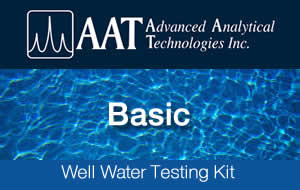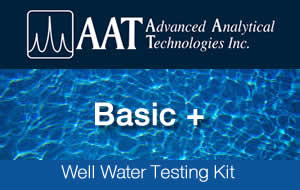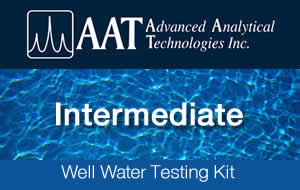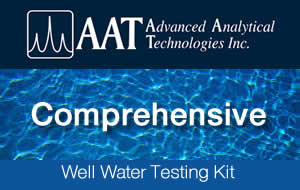We offer 6 Well Water Testing Kits
You collect the samples yourself and mail them to us or drop off at our lab.
Basic Well Water Testing Kit

Our Basic Well Water Testing Kit is great for diagnosing potential contamination from Coliform and E.coli Bacteria and chemical contamination from fertilizers that are especially important for infants and young children, nursing mothers, pregnant women and certain elderly people. This kit should also be used to diagnose odd tasting water and mineral buildup in piping, household appliances, and boilers.
Additional Reasons to use the Basic Well Water Testing Kit:
- Recurring gastro-intestinal illness
- Corrosion of pipes, plumbing
- Rapid wear of water treatment equipment
Basic+ Well Water Testing Kit

Our Basic+ Well Water Testing Kit is build on Basic package by adding additional analysis for Chloride, Lead, and Copper. This kit should be used to diagnose Bacteria, Chemical Contamination and identify variety of water tasting problems. Especially important for families with young children and homes with old plumbing system.
Additional Reasons to use the Basic+ Well Water Testing Kit:
- Recurring gastro-intestinal illness
- Corrosion of pipes, plumbing
- Salty taste and seawater, or a heavily salted roadway nearby
- Rapid wear of water treatment equipment
NYSDOH Recommended Well Water Testing Kit

Our NYSDOH Recommended Well Water Testing Kit is based on the NYS Department of Health’s “Recommended Residential Water Quality Testing” list of parameters. This kit should be used to test new wells before initial use and to periodically test existing wells.
Additional Reasons to use the NYSDOH Recommended Well Water Testing Kit:
- Recurring gastro-intestinal illness
- Stained plumbing fixtures, toilet tanks or laundry
- Scaly residues, soaps don’t lather
- Rapid wear of water treatment equipment
- Water softener needed to treat hardness
Intermediate Well Water Testing Kit

Our Intermediate Well Water Testing Kit is an enhanced package which builds on our Basic+ Testing Kit by adding additional analysis for Arsenic, 21 Regulated and 38 Unregulated Volatile Organic Compounds (VOCs). This is an ideal screening package for testing private wells for the first time or to monitor the condition of existing wells on regular basis.
Additional Reasons to use the Intermediate Well Water Testing Kit:
- Recurring gastro-intestinal illness
- Corrosion of pipes, plumbing
- Dump, junkyard, landfill, factory, gas station, or dry-cleaning operation nearby
- Odor of gasoline or fuel oil, and near gas station or buried fuel tanks
- Salty taste and seawater, or a heavily salted roadway nearby
- Rapid wear of water treatment equipment
Advanced Well Water Testing Kit

Our Advanced Well Water Testing Kit includes analyses covering a core list of contaminants that are required to be tested by local or county regulations. This is an excellent package for people interested in obtaining a comprehensive picture of their well water condition.
Additional Reasons to use the Advanced Well Water Testing Kit:
- Recurring gastro-intestinal illness
- Corrosion of pipes, plumbing
- Dump, junkyard, landfill, factory, gas station, or dry-cleaning operation nearby
- Odor of gasoline or fuel oil, and near gas station or buried fuel tanks
- Stained plumbing fixtures, toilet tanks or laundry
- Rapid wear of water treatment equipment
Comprehensive Well Water Testing Kit

Our Comprehensive Well Water Testing Kit is a complete well-known package designed to test for wide range of contaminants, and is a perfect solution to those living near industrial facilities, gas stations, dry-cleaning, dumps, junkyards, landfills and other potential sources of pollution. This kit should also be used by people with wells located near active or historic agricultural lands and have concern about potential pesticides or fertilizers contamination.
Additional Reasons to use the Comprehensive Well Water Testing Kit:
- Recurring gastro-intestinal illness
- Corrosion of pipes, plumbing
- Nearby areas of intensive agriculture
- Dump, junkyard, landfill, factory, gas station, or dry-cleaning operation nearby
- Odor of gasoline or fuel oil, and near gas station or buried fuel tanks
- Stained plumbing fixtures, toilet tanks or laundry
- Salty taste and seawater, or a heavily salted roadway nearby
- Rapid wear of water treatment equipment
